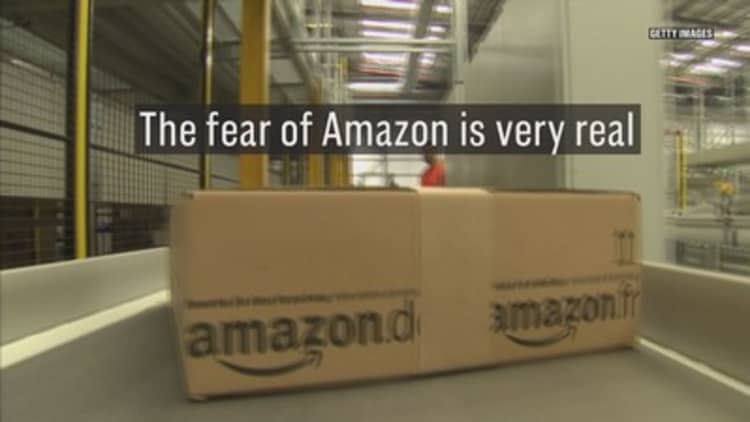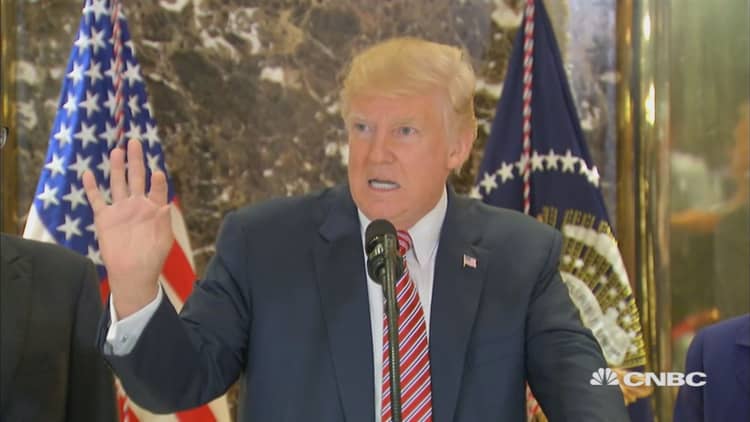
The retail industry isn't the only one that can't stop talking about e-commerce giant Amazon.com.
Of 460 companies in the that already have held earnings conference calls this reporting season, Amazon has been mentioned on 69 of those calls, or about 15 percent, according to a review of transcripts and data available on FactSet.
The topic engaged the chief executives from mall operators to a satellite TV provider, consumer products makers, an auto parts retailer, and pharmacy and drug companies.
In contrast, the Chinese e-commerce company Alibaba has come up on just five calls, according to FactSet. Wal-Mart has been mentioned on 16 calls, Facebook 22 and Apple 25. President Donald Trump's name has come up on just 17 calls, the word "death" 13 times and the word "taxes" 133. Congress was mentioned in 32 cases.
On Tuesday, the chief executive of outdoor and recreational retailer Dick's Sporting Goods said the retail industry is in "panic mode" in a war on prices, weighed down by the ever-lurking presence of the e-commerce firm.
Amazon is shaking up the retail industry and pressuring department store chains and mom-and-pop outlets that rely on physical locations and customer foot traffic for sales. But Amazon's $13.7 billion deal for Whole Foods Market, which will give it physical locations as local distribution centers, has warmed the hearts of some real estate executives.
David E. Simon, the chairman and chief executive of Simon Property Group, a luxury mall operator, said "the good news for us, as an industry, it does reinforce that, in my opinion, the importance of connecting with the consumer through a physical business."
Amazon isn't just expanding in the real world through the organic grocery chain. Vornado Realty Trust cited a new 10,000-square-foot lease for Amazon's bookstore in DC's Georgetown neighborhood, where it is replacing the high-end retailer Barneys, as well as a second bookstore location on West 34th Street in Manhattan.
Conor Flynn, CEO of open-air mall operator Kimco Realty, said, "The debate surrounding the death of physical retail is over." He cited not only the Amazon-Whole Foods tie-up but a similar deal between Wal-Mart and Jet.com and a new smaller store concept by Target as the new normal.
Grocers as mall anchor stores are gaining as an opportunity, he said, especially with the growth of Trader Joe's and the influx of the European chains Aldi and Lidl in the U.S. market.
"Those that embrace and master the omnichannel approach that combine technology, social media and physical real estate will thrive," he said. "Those that ignore will do so at their own peril."
Dish Network's CEO Charles William Ergen was asked by an analyst about the effect of tech companies trying to get into the connectivity business, like Google Fiber's internet service, and answered that Amazon may go there next.
"You're going to need a core layer of how you connect. And I think that the four big incumbent carriers are pretty well-positioned there," he said. "And I think we're pretty well-positioned there too."
He added that Amazon's ambitions for drone and autonomous vehicle delivery are going to need connectivity as will its video streaming to mobile devices business. "They have to look at connectivity as part of their future. They may be able to do that if they could just peel off some money and buy one of the incumbent carriers, or they could lease spectrum," Ergen said.
Clorox executives said they weren't concerned about Amazon's efforts to sell household products under non-brand labels even as they sell their well-known brand alongside those other products.
"I don't look at Amazon as a customer that's in any way different than our other customers, and I would look at that as an opportunity as well as a risk," CEO Benno Dorer said. "But the opportunity far outweighs the risk, and we're taking advantage of it."
Auto-parts retailer O'Reilly Automotive sees physical locations as one of its competitive advantages, mostly because customers tend to need auto parts right away and can bargain in the store if they see a lower price online.
"We work with them to come up with a price that makes sense for them to walk out of the store with the part," CEO Gregory Henslee said on the company's conference call. "We don't walk customers over pricing relative to Amazon and online pricing pressure."
Talk that Amazon was getting into the online pharmacy sales business caught the attention of Express Scripts CEO Timothy Wentworth, who said the company would be "interested in working with them." CVS Health CEO Larry Merlo said he wasn't concerned Amazon would erode their business, especially because pharmacies offer in-person services an online provider cannot.
"So listen, there's no question that Amazon is a competitor in the marketplace," Wentworth said on the company call. "They've done a great job, and you don't take anything that they're doing for granted. But at the same time, I think that we have a lot of capabilities and a value proposition that can compete effectively in the market."
WATCH: Trump takes another shot at Amazon


